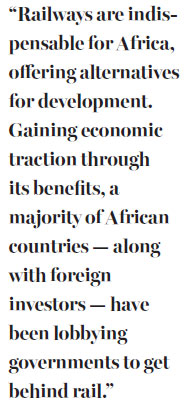Railways in Africa: A balancing act
Updated: 2016-11-11 07:35
By Wendy Noel Ouma(China Daily Europe)
|
|||||||||
It is prudent to ensure that issues are clearly articulated by governments rather than subjecting projects to rumors
Railways have been a significant means of transport in Africa since the colonial era. Globally, it is known as the mode with the least number of accidents, highest efficiency and greatest convenience.
The advantages rail offers in long-distance coverage, affordability and suitability for heavy and bulky goods attracts shippers.
Most African governments have sought railways as a means to maximize their trade benefits and cut costs. Rail presents an opportunity to ensure that the African continent is interconnected as one.
So when China made a reasonable offer to build railways in Africa, governments on the continent welcomed the idea. The construction of railway lines in Africa is foremost meant to enable transportation of goods and services from one country to another swiftly, efficiently and cost-effectively.
A second motivation is to enable easy movement of natural resources to manufacturing plants within Africa. This will enable Africa to become independent in managing its own resources and ensuring that they are used within Africa and not outside.
Certain conflicting views, however, have been associated with railway construction - for example, the opinion that railways are a losing vision, based on the fact that the majority of infrastructure projects funded by international financial institutions have involved roads and energy. But in Africa it's a different story. Kenya, Tanzania, Botswana, Senegal, Zambia, Cameroon, Madagascar and Morocco have all taken up railway construction projects.

Railways are indispensable for Africa, offering alternatives for development. Gaining economic traction through its benefits, a majority of African countries - along with foreign investors - have been lobbying governments to get behind rail.
Various challenges in specific countries have delayed certain projects and roped Chinese firms into controversies. The one thing everyone needs to acknowledge is that it is not wise to shoot the laborer, since the work you intended to do will not be done. It has been unfair for African peoples to blame China when controversies have arisen. They forget that it's their own governments' duty to ensure that their citizens are informed.
A case in point is Kenya, where a standard-gauge railway has been held up because it would pass through Nairobi National Park - the only national park in the world that lies within a city. It receives over 15,000 tourists in a month and has blocked rail construction since 2013.
After an uproar from environmentalists, animal preservationists and citizens of Kenya, alternatives have been presented, including the idea of an overpass through the park instead of trains on the ground. This was believed to be the better alternative to a suggested detour, which was said to increase the cost by $220 million (199 million euros; 177 million).
The overpass concept resulted in a study of wildlife interactions with the structures, where video monitors were attached to the animals. This was to aid the government in making a final decision on where the railway line would pass, keeping in mind concerns in regard to interruption of the natural habitat and movement of the animals.
Another controversy associated with the proposed line is the alleged possibility of corruption, including bribery. That prompted a probe by Kenya's Ethics and Anti-Corruption Commission. Other concerns lodged included a charge that one-third of port cargo being transported by the railway would limit traders' freedom to choose their means of transportation.
Considering the benefits of railway lines, it is worth giving it a chance. It does not present any economic liability.
Meanwhile, as we wait to reap the benefits of railway construction across Africa and other places, it is prudent to ensure that issues are clearly articulated by governments rather than subjecting projects to rumors and negative propaganda.
It is also a simple matter of fairness that the Chinese companies doing the work do not encounter a hostile environment. That only impedes their performance.
The author is a senior policy analyst and coordinator of Center of Emerging Powers at the Africa Policy Institute. The views do not necessarily reflect those of China Daily.
(China Daily European Weekly 11/11/2016 page8)
Today's Top News
Alibaba Singles Day sales hit 10b yuan in 7 minutes
Obama, Trump meet at White House
Xi congratulates victor Trump
Polls missed support for Trump
Superstars party with Jack Ma before shopping spree
Europe would elect Clinton: Poll
UK 'will stick to planned EU departure plan'
UK PM May promises EU exit 'in full'
Hot Topics
Lunar probe , China growth forecasts, Emission rules get tougher, China seen through 'colored lens', International board,
Editor's Picks

|

|

|

|

|

|







